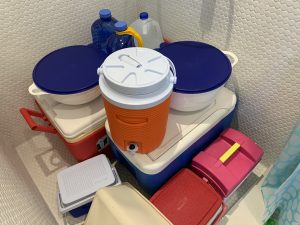
Coolers, jugs, gallons, bowls holding water. Photo credit: Isabel Wong.
I am waiting for Douglas. I am waiting for a hurricane.
A few days ago, around the time COVID-19 cases began spiking in the islands, news of a hurricane surfaced. As the storm barrelled across the Pacific Ocean, my family began preparations, bringing home cans of Spam and beans and scraping leaves out of gutters.
This morning, I woke to the sound of my father locking windows. In the kitchen, my mother rinsed old containers with watered-down bleach, instructing me to download a hurricane emergency guide onto my phone.
Beyond our sealed windows, Hawai‘i has been preparing, too. Schools and auditoriums are open as shelters. We know which accept pets, and, thanks to the Hawaiian Humane Society, how to care for them in a hurricane. From state officials, we learn how the pandemic has altered hurricane protocols, from a Board of Water Supply PSA, to add one drop of bleach to each gallon of water to make it potable. We take note of it all. But, we also laugh when I spill water transporting filled coolers, the water too high, just as my sister warned me. We laugh when the thermos we once used to carry lukewarm soup to school is filled with water. Then again when we count the bottles and jugs and jars we’ve collected and the number is 31, six for each of us, and one, the soup thermos, left to fight over.
I know how to prepare for a hurricane, but how I’m supposed to prepare for thesis research is less clear. My two recently graduated Barnumbia friends told me preparation can help but isn’t necessary. Other resources stress otherwise. The result is a spike of worry whenever I hear “thesis” thrown around, my hands restless from lack of use. In preparing for Douglas though, I’ve found an answer regarding how to prepare for research, and it’s not summer studying.
Right before logging off a senior thesis presentation Zoom call earlier this year, I glimpsed the director congratulating the presenters, heard them all laugh and sigh in relief. I smiled. They may have presented from their own rooms, but they hadn’t researched alone. Each week for a year they had met, physically or virtually, bringing their questions, quandaries, worries. They were one another’s sounding boards, safety nets, shoulders to lean on, laugh on, vent on. The Core may completely overwhelm us at times—that first Lit Hum in Lerner, the presenter reciting page numbers and passages from memory, terrified me—but its requirements force us all together, just as Senior Seminar ensures that while we may feel overwhelmed and unsure during the research process, we are never overwhelmed and unsure alone.
Previously, I said I need to embrace uncertainty in order to allow for all possibilities. Although uncertainty may prove fruitful at times, a byproduct of walking through the unknown is that disaster, big or small, is one such possibility. While devastating, disaster reveals our reliance on one another, unearths community’s structures and strengths. If you’ve invested yourself in your community, then no storm is ever braved alone. Disaster may be inevitable, but with the support of others, adventuring the unknown feels less scary. Someone will help you tape windows, mop flooded floors.
In a community, hard decisions can air outside your head, and roadblocks are navigated with others, some of whom have already wearied the roads ahead. Guarding against mistakes isn’t paralyzing when someone is standing beside you, will help you through the mud. If research has no set path, no predetermined destination, then we can never completely prepare for it. However, when we find ourselves so fortunate as to live and work within communities, be them entire islands or soon-to-be Senior Seminar families, we can embark upon research knowing that each slippery conundrum, each ethical tar pit, each grind of pestle against mortar will be met with not just one mind, but two, with not just one hand, but many.
Perhaps we cannot fully predict what research will bring us, cannot prepare for every unknown and possibility, but we don’t begin completely unprepared. Rather, we are already equipped with resources that will never rust, and, in the case of Senior Seminar, will only sharpen over time; with resources that will never deplete, only deepen, if one replenishes them with reciprocity; resources more life-saving and rare than any toilet paper roll, any bottle of hand sanitizer. Communities, research communities, cannot prepare for the unknown, nor for a hurricane, but its members can weather it together.
